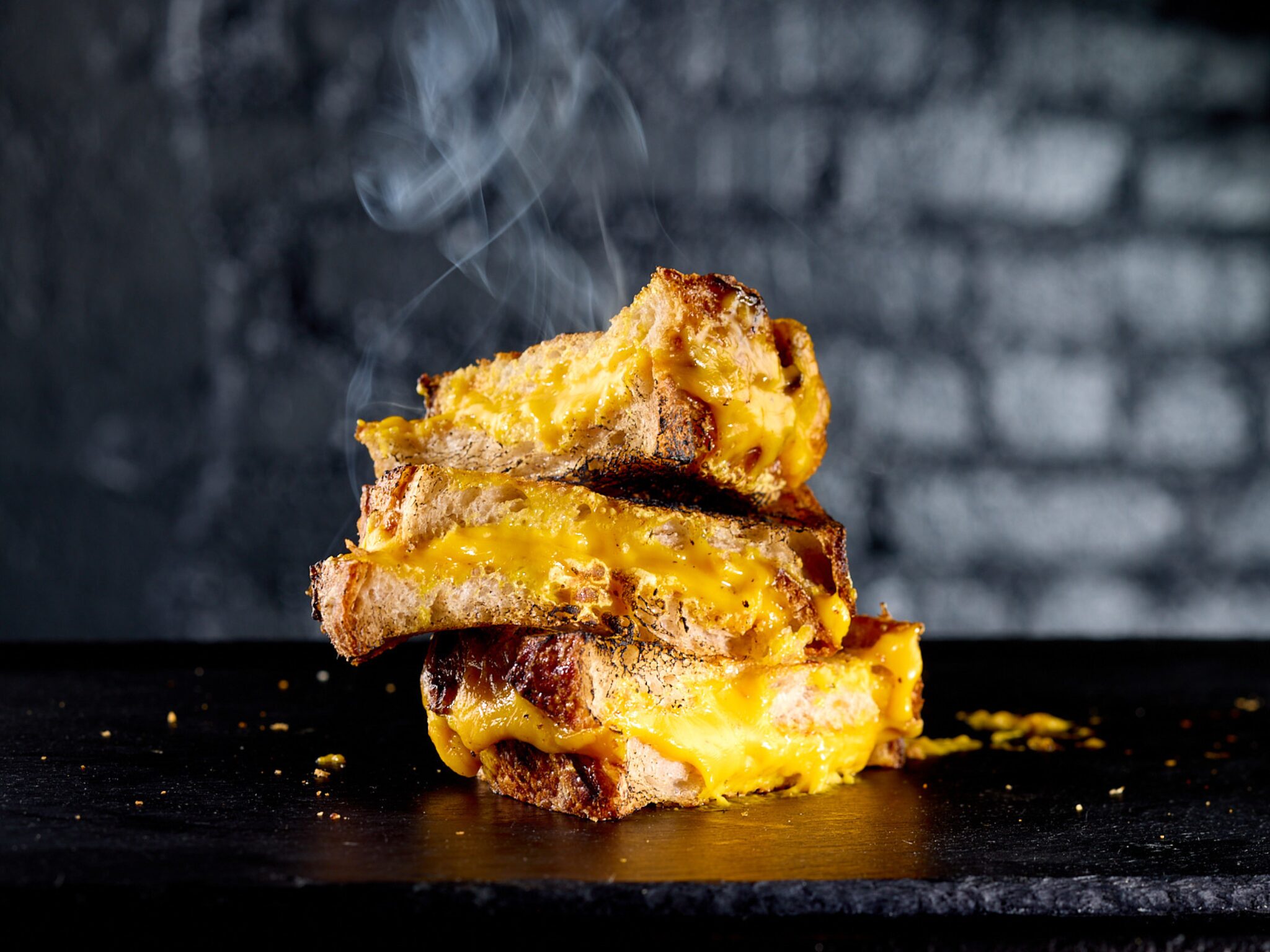Cultured Cheddar Slices: Stockeld Dreamery Bets on Fermentation for ‘Third Wave’ of Vegan Cheese
7 Mins Read
Swedish vegan dairy startup Stockeld Dreamery has launched fermented Cheddar slices called Melt, which it describes as part of the ‘third wave’ of plant-based cheese.
Stockeld Dreamery is bringing fermentation to sliced cheese with its latest innovation, Melt, a plant-based Cultured Cheddar SKU that ushers in what the Swedish brand calls the ‘third wave’ of vegan cheese.
Developed over four years, Melt is made from the company’s fermented legume milk (with a pea protein base) and promises a departure from the ‘plasticky’, non-melty texture that plant-based cheeses have long been derided for.
In an online post, Stockeld Dreamery founder and CEO Sorosh Tavakoli argued that while consumers and coffee shops alike are on board with plant-based milk, “the demand for cheese hasn’t been there because it has felt too much like a sacrifice”. But fermentation will “change the game”, he insisted.
“Fermentation helps bring more authentic flavour to cheese, it gives cleaner ingredient lists and increased health benefits,” he explained.
Cultured Cheddar signals ‘third wave’ of vegan cheese
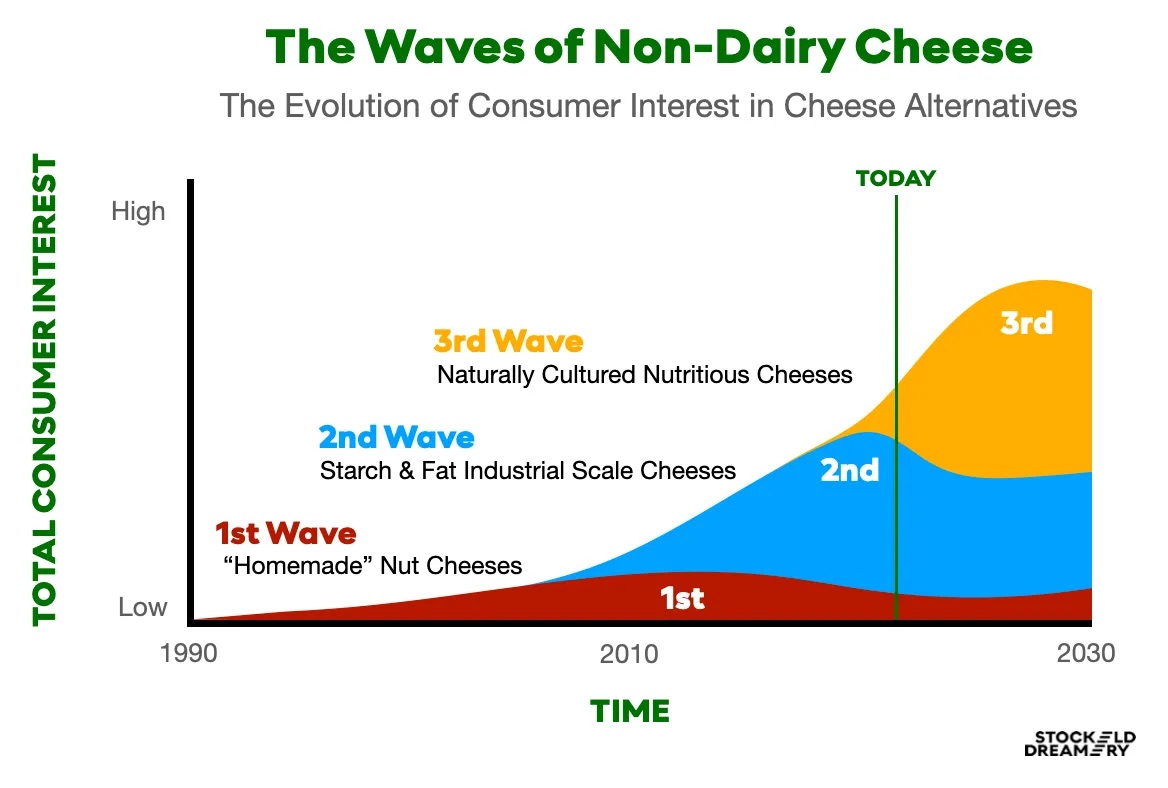
Tavakoli describes the evolution of vegan cheese over the years, divided across three waves of technology and innovation. The first wave predated the widespread market for plant-based food when homemade nut cheeses were the only way for “the believers” to get by. “These products provided a clean label and nutrition but lacked many parts of the cheese experience, such as flavour and the creamy texture,” explained Tavakoli. In its current form, this wave lives on with artisanal nut cheeses.
The second wave, which still dominates the vegan cheese landscape today, belonged to Big Food, which entered the market with efficient, industrial-scale processes to make products that blended starch, fat and aromas. “This cheap method laid the ground for the next phase of growth, bringing plant-based cheese to 1-2% of total cheese sales, but not further,” noted Tavakoli.
Now, the third wave of next-generation products valorises natural fermentation and nutrition to deliver products aimed at flexitarians. Companies working on these cheeses are “using the traditional dairy cheesemaking process of fermentation, a 10,000-year-old natural food processing method where you use healthy bacteria to nibble on foods to transform flavour, texture and overall characteristics of your foods”.
Stockeld Dreamery’s Melt keys into consumer demands

This is where Stockeld Dreamery’s Melt comes in. The company says the slices represent an amalgamation of the taste and texture attributes of vegan cheese consumers have been clamouring for. Last year, a study leveraging Kroger data from 60 million US households – the company’s target market – revealed that texture is the aspect Americans dislike most about vegan food, followed by its high price (Stockeld Dreamery’s Cultured Cheddar is twice as expensive as conventional Cheddar).
When it comes to vegan cheese, 73% of US consumers are unhappy with the flavour (“plastic” or “unnatural”) and texture (“grainy”). They want cheeses that taste better, melt well and have a creamy texture – all traits that have been used to describe the Melt slices.
So what gives Melt its Cheddary flavour? Tavakoli ascribed it to a combination of all the ingredients together. “Most vegan cheese is made by starch, fat and aromas, and completely lacks protein – hence, there’s very little taste in there from the get-go,” he told Green Queen. “This gives one a blank sheet to add aromas and build a desired flavour profile. The challenge is that it can taste fake and artificial.”
He added: “With this product, we started with a fermented base with protein that already naturally has some flavour. We are really happy that we’ve been able to create a much more natural flavour profile than our peers and we’ve gotten plenty of feedback that the product lacks the ‘terrible off-flavour aftertaste’ that other cheeses usually carry.”
Plus, it melts at “record speed” (twice as fast as other non-dairy counterparts according to Stockeld), is suitable for cold-handling and flipping for foodservice, and sticks to buns and patties to hold a burger together.
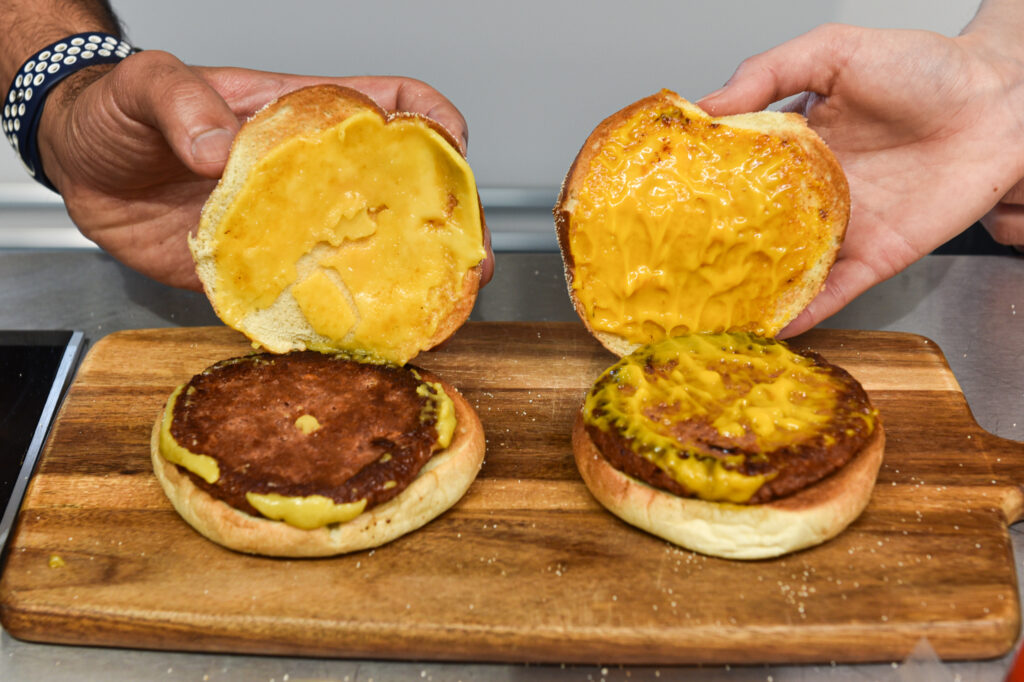
But as much as Americans care about taste – their number-one purchase driver – a 1,022-person survey by the International Food Information Council (IFIC) last May found that health, in fact, is the major factor behind consumers eating vegan or vegetarian diets, with six in 10 choosing it.
How does Melt stack up? With an ingredient list featuring cultured pea milk, modified potato starch, highly refined coconut oil, rapeseed oil, salt, beta carotene for colour), yeast extract, potassium sorbate and natural flavours, the product still traverses the formula of the second wave described by Tavakoli though it notably elevates it thanks to fermentation.
A two-slice of Melt serving contains a respectable 2g of protein, alongside 7g of carbs, 9g of fat (6g of which is saturated), and 120 calories. Moreover, it’s free from soy and nuts, making it suitable for people with those allergies.
There’s also the environmental benefit – while the company is carrying out a life-cycle assessment for the new cheese, Tavakoli approximates that its overall footprint would be roughly between that of its two previous products, Stockeld’s cream cheese (with a 70% lower carbon footprint than its conventional counterpart) and its now-discontinued feta (95% lower).
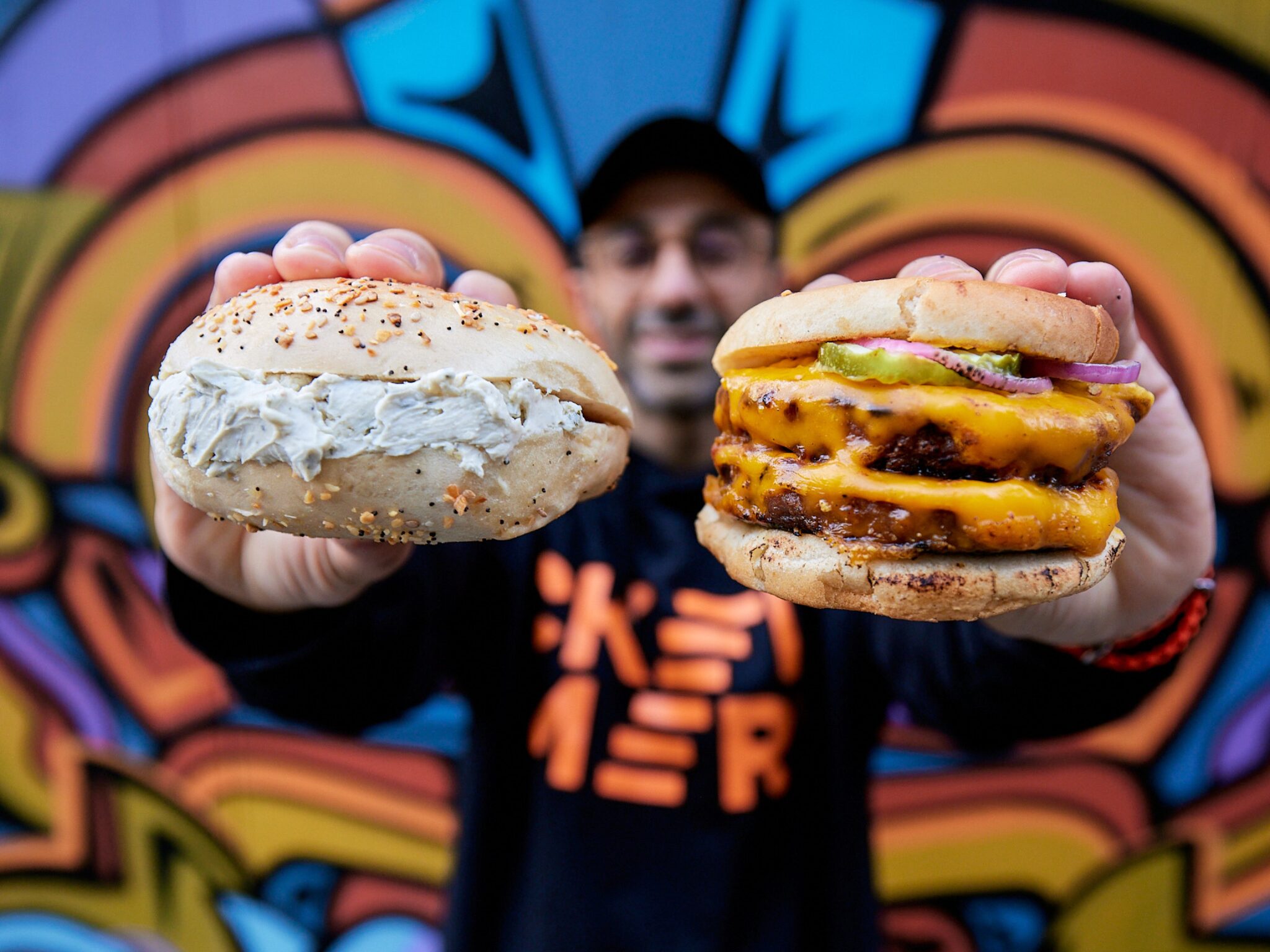
The Melt slices serve as proof of the concept laid out by Danish researchers over the last couple of years, who have found that yellow pea protein – already the fastest-growing protein ingredient in plant-based meat – makes a good base for fermented plant-based cheese. “Bacteria can serve to develop firmness in non-dairy cheese in a very short period of time while reducing the bean-like aroma of yellow pea protein, which is used as the main and only protein source,” explained scientist Carmen Masi.
Melt available in NYC foodservice, with retail launch planned for summer
Stockeld Dreamery’s new cheese is the result of four years of work. For the first three years, the company had been working on mozzarella. “While we had prototypes that performed better than our peers it just never met the high standards that we set out for ourselves to justify a launch,” Tavakoli wrote in the blog post.
Then, the team decided to test it in applications beyond pizzas, bringing it to some burger chefs who loved the product, kickstarting “a pivot towards a melting sliced cheese, designed for burgers, grilled cheese sandwiches, mac ‘n cheese and other similar applications”.

The Cultured Cheddar slices combine the fermentation of the third wave with “industrial-scale manufacturing and more functional, accessible and affordable ingredients than nuts, such as legumes or oats”. Finding an industrial partner with fermentation, cheesemaking and slicing capabilities was a “massive challenge”, but the company has found a solution with strong partnerships in Ohio.
Stockeld Dreamery, which raised $20M in a Series A funding round in 2021, has partnered with over 50 bagel shops, including Ess-a-Bagel in New York City, for its fermented cream cheese. But Tavakoli cited SPINS data that shows the $12B sliced cheese market is thrice as large as the cream cheese sector in the US, though only 1.2% is captured by plant-based sliced alternatives. (This is on par with vegan cheese’s 1.1% share of the overall cheese market, with retail sales of $233M from 2022-23, a 2% year-on-year drop).
While retail distribution for the new Melt slices is planned for the summer, a host of NYC burger shops are already carrying the cheese. These include Gotham Burger Social Club, Five Napkin Burger, Bronx Brewery/Bastard Burgers, Smashed, Burger Joint and Neat Burger, among others. The chilled product will be made available at ACE Natural, Fischer Foods and Webstaurant in a few months, with national distribution earmarked for the next three to six months.
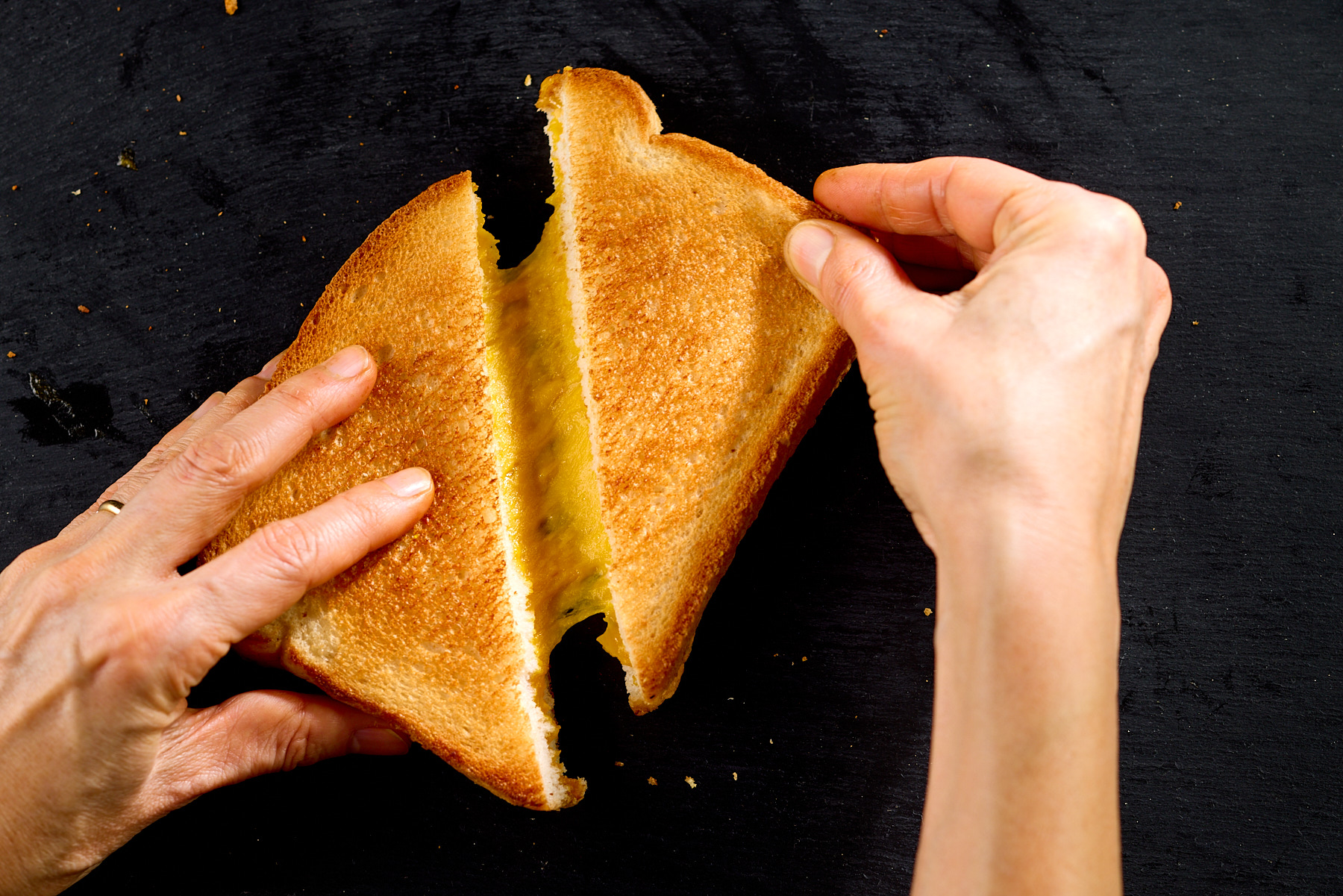
Stockeld Dreamery isn’t the only brand banking on fermentation for a better sliced vegan cheese. Late last year, Canadian plant-based giant Daiya reformulated its entire line of vegan cheeses with a base of its new fermented oat cream.
“Our goal with this product is to help make sustainable options tastier and more accessible for the masses,” explained Tavakoli. “We aim to increase the number of restaurants carrying dairy-free cheese, to make operators give consumers a choice when they order burgers, whatever the patty is made of and to make kid’s menus more accessible with dairy-free grilled cheese.”

